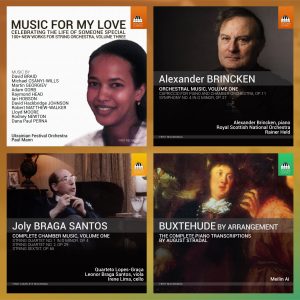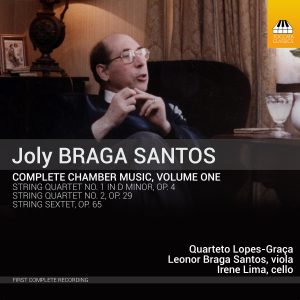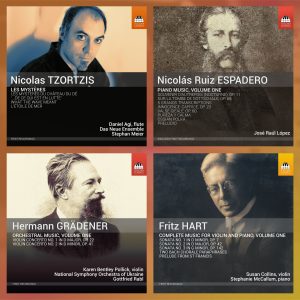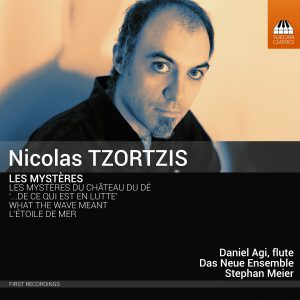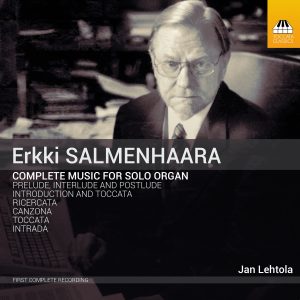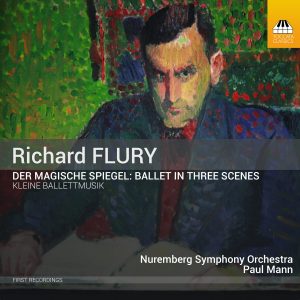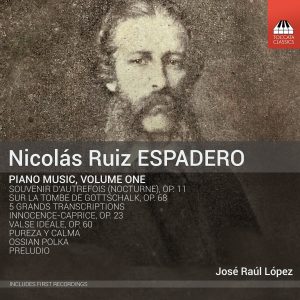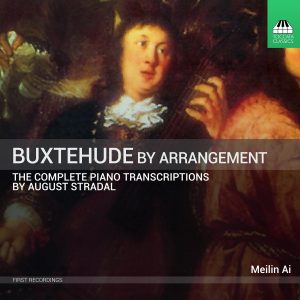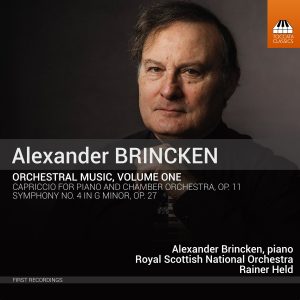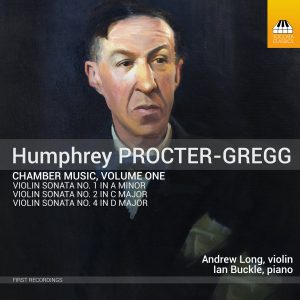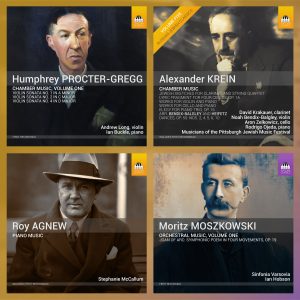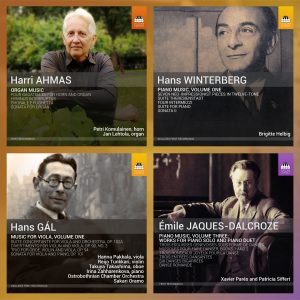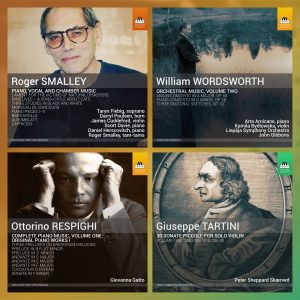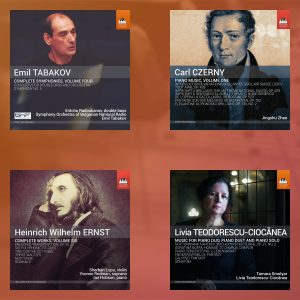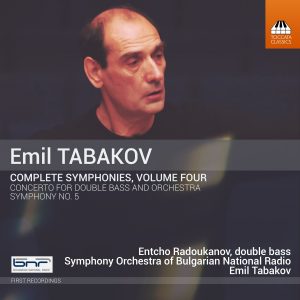Search Results for "Space Wolf: The First Omnibus mp3 torrent" – Page 54
December 2019 Bundle
Included in this bundle:
Joly Braga Santos: Complete Chamber Music, Volume One
Joly Braga Santos (1924–88) was one of the most important composers in twentieth- century Portugal. In his early works his fondness for modal harmony, absorbed from the Portuguese masters of the Renaissance, and his busy counterpoint combine to make him sound surprisingly close to such particularly English composers as Vaughan Williams and Moeran. Although his harmonic language became more astringent with time, it retained a burly sense of humour and a powerful charge of energy.
Quarteto Lopes-Graça
Luís Pacheco Cunha, violin
Maria José Laginha, violin
Isabel Pimentel, viola
Catherine Strynckx, cello
Leonor Braga Santos, viola (Tracks 8–10)
Irene Lima, cello (Tracks 8–10)
November 2019 Bundle
Included in this bundle:
NICOLAS TZORTZIS: Les Mystères
The music of Nicolas Tzortzis, Athens-born (in 1978) and now a resident of Paris, often involves other art-forms, not least video and elements of theatre. Two of the works on this album, part of a trilogy inspired by surrealist films by Man Ray, are intended to mirror the unsettling discontinuities of Ray’s films in musical surrealism of their own. Another, ‘… de ce qui est en lutte’, has its starting point in an aphorism of Heraclitus, and seeks coherence in extremes of contrast, throwing ideas against one another like images in a kaleidoscope. And What the wave meant – the title comes from a song by the Red Hot Chili Peppers – processes the stages of grief. All four pieces pay close attention to instrumental timbre and bristle with energy, occasionally leavened by an anarchic sense of humour.
Daniel Agi, flute
Das Neue Ensemble
Stephan Meier, conductor
Erkki SALMENHAARA: Complete Music for Organ Solo
As composer, musicologist and critic, Erkki Salmenhaara (1941–2002) was one of the major figures in Finnish musical life in the second half of the twentieth century. His music for organ charts his stylistic evolution, from a modernism influenced by his teacher, György Ligeti, to triadic harmonies spiced with dissonance. Even so, all these works manifest his fondness for the ability of the organ to generate massive and powerful blocks of sound, giving this music a monumental character in keeping with the grand spaces of the buildings in which it is usually heard.
Jan Lehtola, organ of Turku Cathedral
Richard FLURY: Ballet Music
Der magische Spiegel (‘The Magic Mirror’), a 1954 ballet by the Swiss composer Richard Flury (1896–1967), tells a pantomime tale of flirtation, cuckoldry, magical spells and perdition – but this is no puritanical morality play: using the limited resources of a chamber orchestra to surprisingly full-bodied effect, Flury conjures up a delightful sequence of dances – a generous number of waltzes, with a czardas, a bolero and more – that skip past in good-humoured succession. And behind its innocent title, the Little Ballet Music of thirty years earlier hides a buoyant dance-suite, scored with a feeling for colour that would have gone down well in Hollywood.
Nicolás Ruiz ESPADERO: Piano Music, Volume One
In this second volume of his survey of Cuban composers for the piano, José Raúl López presents the work of Nicolás Ruiz Espadero (1832–90), the most prominent name in Cuban music in the second half of the nineteenth century, both at home and abroad. Espadero’s output ranges from delicate Chopinesque salon miniatures to barnstorming Lisztian operatic paraphrases that demand a fearsome virtuoso technique to do justice to their high-Romantic swagger.
José Raúl López, piano
Buxtehude by Arrangement: The Stradal Transcriptions
Busoni’s transcriptions of Bach have long been one of the mainstays of the piano repertoire. Bach himself worshipped the music of the Danish-born Dieterich Buxtehude (c. 1637–1707), famously walking 250 miles to Lübeck to hear him play. The Liszt student August Stradal (1860–1930) obviously shared that admiration, transcribing ten of Buxtehude’s most imposing organ works for piano, thus creating alongside ‘Bach-Busoni’ a corpus of grandiose – and virtuoso – Baroque music for the modern concert grand that has somehow remained almost entirely unknown.
Meilin Ai, piano
Alexander BRINCKEN: Orchestral Music, Volume One
Alexander Brincken, born in Leningrad in 1952 and Swiss-based since 1992, writes in an accessible and unashamedly late-Romantic language. His grandiose Fourth Symphony of 2014–15, written for a huge orchestra, has echoes of a number of earlier composers, among them Berlioz, Bruckner, Martinů, Wagner and, especially, Franz Schmidt and Richard Strauss, all assimilated into a big-hearted style that blends dignity, lyricism and power, with a strong sense of the Swiss landscapes in which he has made his home. The earlier Capriccio for piano and orchestra – a concerto in all but name – has, in turn, something of the sober strength and wiry energy of Frank Martin – curiously, since it was written seven years before Brincken moved to Switzerland.
Alexander Brincken, piano
Royal Scottish National Orchestra
Rainer Held, conductor
Maya Iwabuchi, leader
HUMPHREY PROCTER-GREGG Chamber Music, Volume One
The public persona of the English composer Humphrey Procter-Gregg (1895–1980) was that of an academic and administrator (he founded the Music Department of Manchester University), and he was held in high regard as a writer and a translator of opera. But his own music reveals a startling degree of energy and passion, perhaps reflecting his fondness for the outdoors. These violin sonatas point to an enthusiasm for Delius, particularly in their more wistful passages; more surprisingly, they also show a stylistic proximity to the music of Fauré.
Andrew Long, violin
Ian Buckle, piano
ALEXANDER KREIN: Chamber Music
Alexander Krein (1883–1951) was a member of a dynasty of Jewish musicians active in both Imperial and Soviet Russia. His compositions reveal the confluence of several strands of musical history: his Russian background, the transition from late Romanticism to early modernism – where the influence of Skryabin is readily audible – and, particularly in the works on this album, the Jewish folk-heritage, with its emotionally powerful blend of high spirits and melancholy.
David Krakauer, clarinet (Tracks 1 – 3, 18 – 19)
Noah Bendix-Balgley, violin (Tracks 5 – 10, 12 – 16)
Aron Zelkowicz, cello (Tracks 1 – 4, 6, 11, 17 – 19)
Rodrigo Ojeda, piano (Tracks 5 – 17)
Musicians of the Pittsburgh Jewish Music Festival
Jennifer Orchard, violin (Tracks 1 – 3, 18 – 19)
Dennis O’Boyle, violin (Tracks 1 – 3, 18 – 19)
Marylène Gingras-Roy, viola (Tracks 1 – 3)
Mikhail Istomin, cello (Track 4)
Michael Lipman, cello (Track 4)
David Premo, cello (Track 4)
October 2019 Bundle
Included in this bundle:
September 2019 Bundle
Included in this bundle:
August 2019 Bundle
Included in this bundle:
July 2019 Bundle
Included in this bundle:
Emil Tabakov: Complete Symphonies, Volume Four
The music of the Bulgarian composer-conductor Emil Tabakov (b. 1947) explores the darker side of the human spirit in epic scores as austere as they are powerful. His mighty Fifth Symphony, a work almost an hour in length, is obsessive and violent, with the two outer movements, wild kaleidoscopes of whirling colours and driving energy, framing a tragic slow movement and a sardonic march. The much earlier Double-Bass Concerto, which sits downstream from Shostakovich, shows the same grim sense of humour in the teeth of the dancing indifference of fate.
Entcho Radoukanov, double bass Tracks 1 – 3
Symphony Orchestra of Bulgarian National Radio
Emil Tabakov, conductor
Stay In the Know
JOIN THE TOCCATA NEWSLETTER
"*" indicates required fields
By visiting our site, you agree to our privacy policy regarding cookies, tracking statistics, etc.
